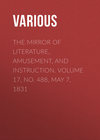Read the book: «The Mirror of Literature, Amusement, and Instruction. Volume 17, No. 488, May 7, 1831», page 4
In Botany, Mineralogy, and Geology, are—a valuable paper on the Flora of Sicily; Supposed sub-marine banks from Newfoundland to the English Channel: Mr. Bakewell, Jun. on the Falls of Niagara: Mr. Bicheno on the Shamrock of Ireland; Effect of Light on Plants; Immense Tree in Mexico; Mr. Murray on Raining Trees; Forms and Relations of Volcanoes; Cuticular Pores of Plants; Volcano of Pietra Mala; Milk Tree of Demarara; Productiveness of Plants and Animals; Height of the Perpetual Snows on the Cordillera of Peru; Gerard's Botanical Journey in the Himala Mountains; Changes of temperature in Plants; Humboldt's account of the Gold and Platina district of Russia; Sir H. Davy on the durability of Stone; Dr. Hibbert's account of a Natural Rocking-stone; Notices of Fossil Organic Remains discovered within the year; Instructions for collecting Geological specimens, &c.
The Astronomical and Meteorological division contains some important observations on Atmospherical Electricity, by Dr. Brewster; a note of the recent Visitation of Greenwich Observatory; Snow of the winters 1829-30; Account of a Water-spout on the Lake Neufchatel; Mr. Herapath and Sir James South on the Comet; On the Rending of Timber by Lightning; Curious account of Hay converted into Glass by Lightning; The Occupation of Aldebaran by the Moon; Aurora Borealis observed during the year; and a Journal of the Weather of the year, by Mr. Tatem, the ingenious meteorologist, which paper we regret is not acknowledged from the Magazine of Natural History; appended to this is a tabular Meteorological Summary of 1830, communicated to the Arcana of Science by Dr. Armstrong.
In Rural Economy there are Abstracts from papers of considerable value and extent—on Pasturages, Chlorides applied to diseased Animals, Quality of Waste Land from the plants growing in it, Malt Duties, Beet Root Sugar, Aliment from Straw, Planting and Pruning, Indian Corn, Mangold Wurzol, &c. In Gardening are upwards of 40 similar Abstracts. In Domestic Economy are some practical papers on Milk, Bread, Sugar, Storing Fruit, Beer from Sugar, &c. In Useful Arts are about half-a-dozen, pages. To these heads are added a List of Patents, Notices of Expeditions of Discovery, and a copious Index. The Illustrations, about twenty in number, represent such inventions as are most attractive by their ingenuity; and by way of Synopsis we may state that the whole contents of the volume are nearly 400 abstracts, including probably three times as many new facts.
The utility of such a yearly volume speaks for itself, and however ungracefully a recommendation might come from our pen we could not refrain from thus introducing it to the readers of the Mirror especially as the Arcana of Science contain scarcely half-a-dozen pages of facts which have been detailed in our weekly columns.
NOTES OF A READER
CALENDAR OF THE CHURCH OF ENGLAND
This volume professes to be "A Familiar Analysis of the Calendar of the Church of England," by explaining and illustrating its Fasts and Festivals, &c., in the form of Question and Answer. The reader will not look for novelty in such a work. The editors of Time's Telescope, Clavis Calendaria, the Every-day Book, &c., have been too long and too laboriously employed in illustrating every point of the year's history, to lead us to expect any new attraction. Indeed, the preface of the present work does not profess to furnish any such inducement, the editor resting his claim on the cheapness of his book in comparison with the Every-day Book. This is rather an ungracious recommendation: the "Analysis" consists of less than three hundred pages, and is sold for five or six shillings; but these three hundred pages only equal seventy-five pages of the Every-day Book, or less than five sheets, which the public know may be purchased for fifteen-pence. One of the pretensions of the "Analysis" is its condensed form, but we suspect Mr. Valpy's Epitomizing press would reduce the editor's three hundred pages to seventy-five. It is a thankless office to be obliged to speak thus of a book on which some pains have been bestowed. Now, had it been printed within the compass of an eighteen-penny or two shilling catechism, the desired object would have been obtained; but, as it appears, in the type of a large church prayer-book, what may have been gained in arrangement, must be paid for in paper and print, so that no good purpose is ultimately effected.
FAMILIAR LAW
Parts 3 and 4 of the Familiar Law Adviser relate to Bills of Exchange and Promissory Notes—and Benefit Societies and Savings' Banks—and will be found extremely useful to very different classes. They have in them all the reforming spirit of the times, and must be of essential service everywhere, since cheap law is as desirable us any other species of economy. Brevity, too, as recommended in these little books, should be the soul of law as it is of wit, for we all know that as the law lengthens so the cost strengthens. Another advantage will be, that the sooner a man is set right, the more time will he have for increasing his good actions in this life.
DEATH
Oh God! what a difference throughout the whole of this various and teeming earth a single DEATH can effect! Sky, sun, air, the eloquent waters, the inspiring mountain-tops, the murmuring and glossy wood, the very
Glory in the grass, and splendour in the flower,
do these hold over us an eternal spell? Are they as a part and property of an unvarying course of nature? Have they aught which is unfailing, steady—same in its effect? Alas! their attraction is the creature of an accident. One gap, invisible to all but ourself in the crowd and turmoil of the world, and every thing is changed. In a single hour, the whole process of thought, the whole ebb and flow of emotion, may be revulsed for the rest of an existence. Nothing can ever seem to us as it did: it is a blow upon the fine mechanism by which we think, and move, and have our being—the pendulum vibrates aright no more—the dial hath no account with time—the process goes on, but it knows no symmetry or order;—it was a single stroke that marred it, but the harmony is gone for ever!
And yet I often think that that shock which jarred on the mental, renders yet softer the moral nature. A death that is connected with love unites us by a thousand remembrances to all who have mourned: it builds a bridge between the young and the old; it gives them in common the most touching of human sympathies; it steals from nature its glory and its exhilaration—not its tenderness. And what, perhaps, is better than all, to mourn deeply for the death of another, loosens from ourself the petty desire for, and the animal adherence to, life. We have gained the end of the philosopher, and view, without shrinking, the coffin and the pall.—New Monthly Magazine.
SCOTT AND COOPER
An example of Mr. Cooper's appreciation of his illustrious rival, Sir Walter Scott, occurred while he was sitting for the portrait that accompanied the New Monthly Magazine for last month.—The artist, Madame Mirbel, requested of a distinguished statesman.—"No," said Cooper, "if I must look at any, it shall be at my master," directing his glance a little higher, to a portrait of Sir Walter Scott.
FRANCE
France, "with all thy faults I love thee still!" No man should travel from his cradle to his grave without paying thee a visit by the way: with a disposition prone to enjoyment, it lightens the journey amazingly. The French are a kind people, and it must be his fault who cannot live happily with them. Pity it is, possessing, as they do, whatever can contribute to the felicity of a people in a state of peace, that war should be indispensable in order to render their idea of happiness complete. La gloire and la guerre form the eternal burden of their song—as if the chief business of life were to destroy life. They would fight to-morrow with any nation on earth, for no better an object than the chance of achieving a victory. Laugh at me, if you please, for uttering what you may consider a foolish opinion, but I look upon it as a serious misfortune to them that the two words Gloire and Victoire rhyme together: they so constantly occur in that portion of their poetry which is the most popular, and the best calculated to excite them in a high degree—their vaudeville songs—that the two ideas they express have become identical in their minds; and he will deserve well of his country who shall discover the means of making glory rhyme to peace.—Ibid.
"HELP YOURSELF."
The custom of HELPING ONESELF has its sanction in the remotest antiquity, and has been continued down to the present day in the highest places, and by those whom it especially behoves to set example to the world. It was clearly never designed that man should regulate his conduct for the good of others, for the first lesson taught to the first of men, was to take care of himself; had it been intended that men should study the good of each other, a number would surely have been simultaneously created for the exercise of the principle, instead of one, who, being alone, was essentially selfish. Adam was all the world to himself. With the addition of Eve, human society commenced; and the fault of our first mother furnishes a grand and terrible example of the mischief of thinking of the benefit of another. Satan suggested to her that Adam should partake of the fruit—an idea, having in it the taint of benevolence, so generally mistaken—whence sin and death came into the world. Had Eve been strictly selfish, she would wisely have kept the apples to herself, and the evil would have been avoided. Had Adam helped himself, he would have had no stomach for the helping of another—and so, on his part, the evil temptation had been obviated.
The HELP YOURSELF principle has at no time been extinct in society, while it is seen to be a universal law of Nature. The wolf helps himself to the lamb, and the lamb to the grass. No animal assists another, excepting when in the relation of parent to young, when Nature could not dispense with the caprice of benevolence, which in this instance, be it observed, distresses the parties susceptible of the sentiment; for suckling creatures are always in poor condition. Appropriation is the great business of the universe. The institution of property is, on the other hand, artificial.—Ibid.




















